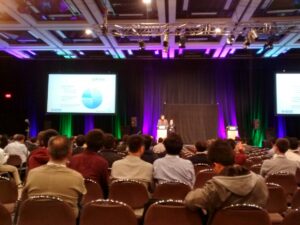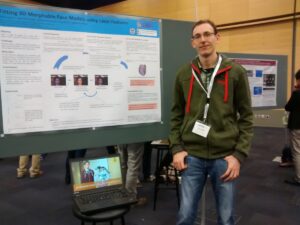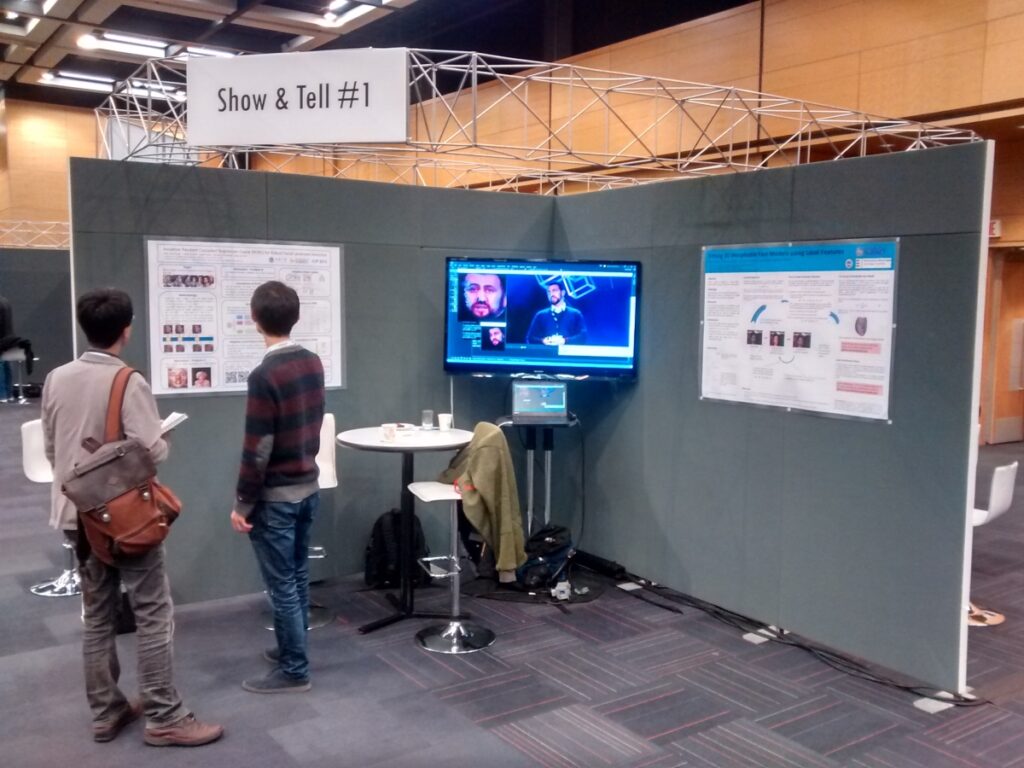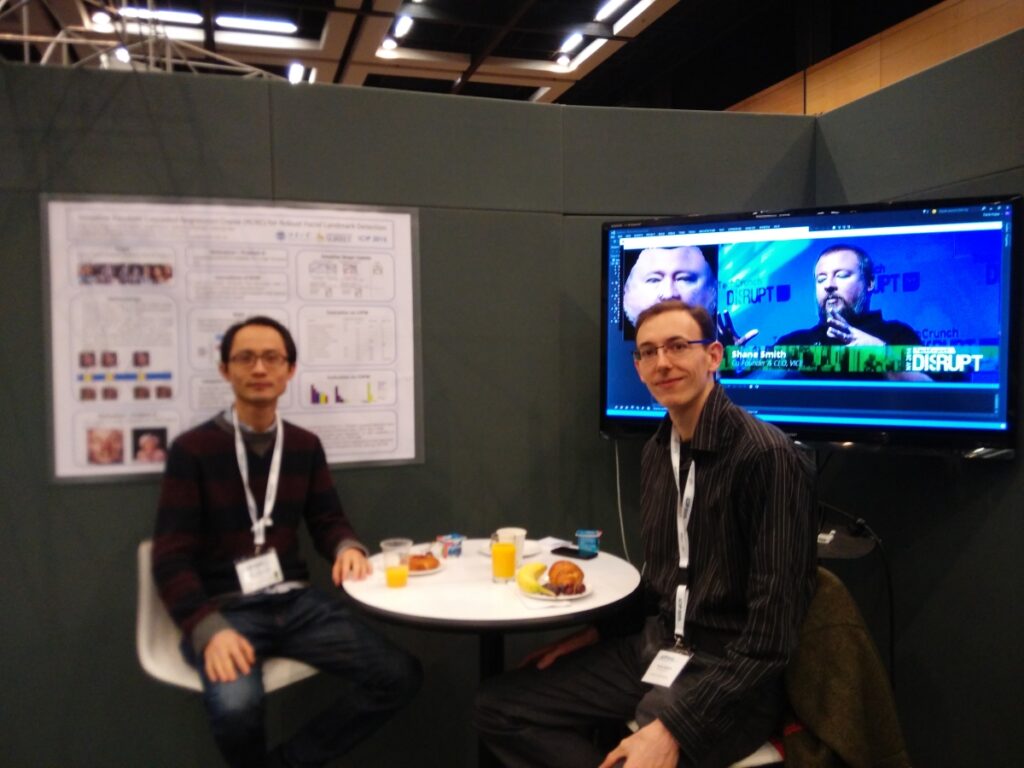Right after CppCon in Seattle, I flew over to ICIP, the IEEE International Conference on Image Processing, in Québec City, Canada. I met my friend and co-worker Zhenhua Feng there, and we were to both present a poster of our joint work each and a Show & Tell demo session together.
On the first day of the (pre-)conference, we registered for a tutorial on Deep Learning in Image Processing and Vision from Yoshua Bengio. The first twenty minutes or so were quite interesting, when Prof. Bengio presented his personal view and opinion on deep learning. I was however quite disappointed by the rest of the session. It was too basic, like a lecture on Machine Learning 101, and I would’ve hoped to learn more from Prof. Bengio. For me, a tutorial is something interactive, where you learn by doing something by yourself, for example a prepared exercise in Matlab or something like that. But maybe my understanding of the word “tutorial” is not correct.
In the afternoon, I attended a second tutorial, which was on Example-based Super Resolution, given by Jordi Salvador and Mehmet Turkan from Technicolor. It was a lecture too, no tutorial, but it was really good in fact. I wasn’t that interested in example-based super resolution (there’s a problem with that when doing biometrics), I was more interested in an introduction to super resolution in general, and the tutorial turned out to be exactly that! It started with a general introduction to super resolution, the early algorithms, their extensions, and went on to different types of algorithms as well as the most recent ones. Though again I would have really liked some practical, hands-on work, it was a great session!

On Monday, the actual conference with the talks and poster sessions started. The conference was huge, it was really crazy. The conference programme alone was a 1.5cm thick booklet. There were 6 or more talks in parallel (it was too much to even count), and a poster session in a huge hall. It was really hopeless to try to make a schedule for the week. ICIP also provided an online scheduling web-app, and I decided to give it a go. I spend an hour or more to go through the sessions and eventually had a schedule of what I wanted to see!
When I went to the first few talks, I quickly got quite disappointed again. I found the talks to be quite bad, there was not much novelty, the talks were not well presented, and there were language issues. I was equally disappointed by the quality of the posters in the first poster session. I knew ICIP wasn’t one of the top-tier conferences like CVPR or ICCV, but I expected it to be somewhere not too far behind them. However, I got the impression that a lot of the presented stuff was undergraduate work and a noticeable amount of the posters had spelling mistakes or missing words even in their titles. There was of course a lot of work presented that was outside my field of knowledge, and I cannot judge that work.
The conference was also a bit too big for my taste. It was so big that it was very anonymous, and it was hard to socialise and for example impossible to find a speaker after their talk or poster session. CppCon was also quite large with its 700+ attendees, but it was manageable. ICIP must be double or triple the attendees.
There were also a few really good papers, and I met a handful of very nice people and had interesting discussions with them. There was one poster about face recognition and super resolution, I think it was from CMU, a poster from UCL or Imperial about AAMs and I met a PhD student from Montréal that is also working on 3D Morphable Face Models. I should have pictures of their posters and might add them along with more details later.

On Tuesday afternoon I had my own poster session, and it went well, a lot of people were interested in the poster. I presented my work on Fitting 3D Morphable Models using Local Features which fits a 3D face model to a 2D image using cascaded regression. I had the help of Zhenhua at the poster, he was there together with me the whole time, which was really great!
On the next day we had our Show & Tell session together, where we got our own booth with a TV to show our work! We presented our real-time 3D face reconstruction on video streams including our facial landmark detection. Sadly my laptop’s webcam worked really bad in the artificial light of the poster hall and it’s FOV is also not good for a demo like this, so we showed the demo on videos most of the time, and showed the live-demo on demand. Next time we should definitely bring a proper webcam. Our work and demos were very well received, we had a lot of people coming to our booth and I’d say it was a big success.
In the afternoon, Zhenhua had his poster session of our paper Random Cascaded-Regression Copse for Robust Facial Landmark Detection. We also both stayed there together the whole time and had lots of fun, though we were quite exhausted from our two previous presentation sessions.
A definite highlight of the conference was also a group from Québec called Painchaud that gave their show at the conference banquet. It was an incredible show consisting of good, fun music, some plays with the audience, and some incredible stunts. The person in the picture below in the end did a full handstand on the guitar and there was much more of this. The whole show was incredible! And Lena was there at the banquet as well and gave a short speech ;-). It was quite fun to hear that before the ICIP organisers contacted her, she had no idea that her picture was so famous in the vision community!
Our hotel was great too and it even had a rotating restaurant on its top. The city was really beautiful, and the food was fantastic in every place. The Québécois have an excellent taste for food!
Overall, it was definitely a great week! Although I was disappointed by the quality of a lot of papers, there were some highlights. And our poster and Show & Tell sessions were really awesome and got us talking to a lot of people. I would always do that again!
I would also like to thank the British Machine Vision Association (BMVA) for their travel grant, without which I would not have been able to attend the conference.





